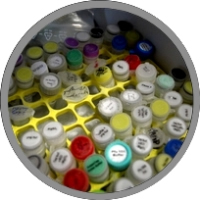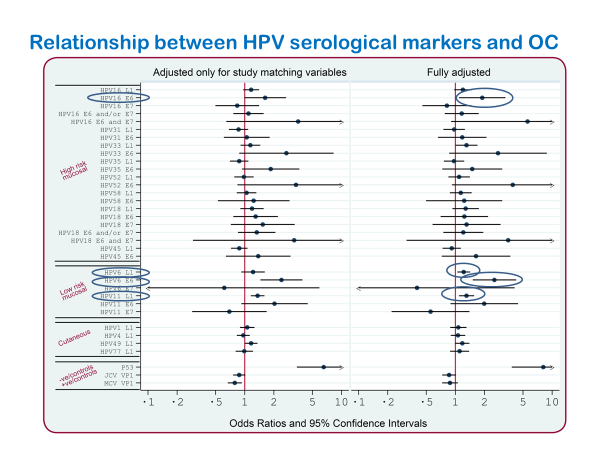Lifestyle, infection, genetic susceptibility and cancer in South Africa: development of research capacity and an evidence base for cancer control
Funded by the South African Medical Research Council and the UK Government’s Newton Fund through the UK Medical Research Council, the ERICA-SA project will utilise lifestyle data and biological samples collected by the Johannesburg Cancer Study (JCS) from 20,000 African cancer patients to investigate the causes of cancer and to enhance scientific research capacity in South Africa.
This will be the largest study of its kind in Africa and will support PhD students to work with an international team of geneticists, infectious disease specialists and epidemiologists from the SAMRC, the NHLS National Cancer Registry, the Sydney Brenner Institute for Molecular Bioscience (SBIMB) at WITS, King’s College London, the University of Cambridge, the German Cancer Research Center (DKFZ) in Germany, the MRC AIDS Virus Research Centre in Uganda, and the University of Sydney, Australia.
The project will cover three areas:
-
Genetic susceptibility to common African cancers
The project will investigate the contribution of inherited genetic variants to the development of breast, cervical and oesophageal cancer. The aim is to identify genes and genetic variants which alter cancer risk.
7000 DNA samples will be genotyped for about 2.5 million genetic variants (single nucleotide polymorphisms or SNPs) and the frequency of each marker in each cancer type compared with their frequencies in 6000 controls. -
Lifestyle risk factors in a broad range of cancer types
This research area will focus on measuring the effect of key exposures that are common and which may lead to cancer, such as smoking, snuff and indoor pollution, alcohol, and hormonal factors. Examination of links with genetic data to investigate potential gene x environmental interactions will be especially encouraged. -
Infectious agents in cancer
The contribution of infections known to cause cancer, such as HIV, Hepatitis B/C, Helicobacter pylori, Human papillomaviruses, Epstein Barr Virus, Kaposi sarcoma-associated herpesvirus and certain polyomaviruses will be measured in about 17,000 serum samples from a wide variety of cancer types. This is a unique opportunity to investigate the role of infection in African cancer on a large and broad scale.


Prof Debbie Bradshaw studied mathematical statistics at the University of Cape Town and completed her Doctorate of Philosophy at Oxford University. She is the Director of the MRC’s Burden of Disease Research Unit. She led the first national South African national burden of disease study and has published extensively on the health status and determinants of health. She is committed to improving the use of data for decision making and has provided technical support to the Department of Health on the Demographic and Health Survey. She has served on several advisory committees at provincial, national and international level. is an honorary Professor in the School of Public Health and Family Medicine at the University of Cape Town. She is the Principal Investigator of the ERICA-SA project
Dr Chantal Babb obtained a PhD in molecular biology at Stellenbosch University, investigating candidate genes for association with tuberculosis in the South African Cape Coloured population. She moved in 2008 to the NHLS Somatic Cell Genetics Unit in the Department of Molecular Medicine and Haematology, University of the Witwatersrand, where she researched the molecular profile of HIV associated lymphomas and colorectal cancer in young black South Africans. The gap in research on cancer genetics in African populations prompted her to join the Cancer Epidemiology Research Group at the National Cancer Registry, National Health Laboratory Service in 2011. She is now working as a Research Associate in the Department of Public Health and Primary Care at University of Cambridge, on the Canrisk project, developing and validating new approaches for breast and ovarian cancer risk stratification and prevention that take advantage of discoveries in both cancer genomics and epidemiology. She is also affiliated to the Division of Human Genetics, University of Witwatersrand.
Ms Noluntu Funani obtained a BSc(Hons) in Medical Microbiology from University of Western Cape and an MMed in Pharmacology from University of Cape Town. She is research coordinator for the office of the MRC President and MRC Continuous improvement Manager. She is managing the operations of the ERICA project.
Professor Kathryn Lewis heads the Statistical Genetics Unit at Kings College London, a large research group of 4 faculty, 8 postdoctoral fellows and 9 PhD students. Her expertise is in identifying and characterizing the genetic variants that underlie common, complex disorders. She has added significant knowledge to the field of both data analysis and methods development in GWAS studies, which track the expanding developments in genomic data generation. She has worked extensively with Professor Christopher Mathew on several GWAS consortium studies and on the genetics of squamous cell oesophageal cancer in South Africa, and is involved in genetic studies in African populations in stroke and hypertension pharmacogenetics. A core part of her academic role is training researchers in cutting edge statistical genetics methods, through annual Summer Schools in Genetic Association Studies, and supervising PhD students (for which she was recently awarded a KCL Supervisory Excellence award). She will play a critical role in hosting, training and mentoring students in bioinformatics and statistical genetics. She currently has grant support from the EU, MRC, has published over 200 papers, with >14,000 citations, and an H index of 48.
Professor Christopher Mathew is Professor in Human Genetics at the Sydney Brenner Institute for Molecular Bioscience, University of the Witwatersrand, South Africa, and Professor of Molecular Genetics in the Department of Medical & Molecular Genetics, King’s College London. He has been working in the field of human disease gene discovery for the past 30 years in both monogenic disorders and in complex disease. He has published 248 peer-reviewed articles in the disease gene discovery field, with an H index of 82, and is on the Thomson-Reuter’s list of the top 1% cited scientists in his field with >32,000 citations. His contribution to medical research was recognized by election as a Fellow of the Academy of Medical Sciences UK in 2001. He has served on many UK research grant panels for the Wellcome Trust and Cancer Research UK, and is currently Chairman of the Cancer Research UK International Cancer Genome Consortium Review Panel. He will be responsible for delivery of the Genetics programme among the UK and SA collaborators.
Professor Rob Newton is Reader in Clinical Epidemiology at University of York and in 2012 seconded to work at the MRC / UVRI Research Unit on AIDS in Entebbe, Uganda, with the remit of developing a program of work on non-communicable diseases. He qualified at the Royal Free Hospital School of Medicine, MBBS, in London. During his pre-registration year he was awarded a MRC Research Training Fellowship enabling him to begin a career in epidemiology. In 1992, He joined the Imperial Cancer Research Fund’s Cancer Epidemiology Unit in Oxford (now Cancer Research UK Epidemiology Unit), where he worked with Dame Valerie Beral FRS on the epidemiology of HIV associated cancers in Uganda and with Professor Freddy Sitas and recently with Dr Chantal Babb in South Africa. He has added significant knowledge on the role of infectious agents and immune suppression in the aetiology of adult and childhood cancer, has significant experience conducting epidemiological research in sub-Saharan Africa, and has published over 130 papers.
Dr Elvira Singh obtained her MBChB from University of Natal, Medical School, an MMed from University of Witwatersrand, School of Public Health and is a Fellow of the South African College of Public Health Medicine. FCPHM. She is a Public Health Medicine Specialist and the Head of the South African National Cancer Registry, Manages the Ekurhuleni Metropolitan District Cancer Registry and is the manager and curator of the Johannesburg Cancer Study data and biospecimens. She is also a member of the Ministerial Advisory Committee on Cancer Prevention and Control in South Africa. She has published on the burden of cancer in South Africa, on paediatric, breast, bowel and haematological cancers, and on the role of HIV on cancer in South Africa.
Freddy Sitas is Associate Professor at School of Public Health at University of Sydney, and a consulting Chief Specialist Scientist at SAMRC Burden of Disease Research Unit. He obtained his undergraduate science degree at University of Witwatersrand and a D.Phil at University of Oxford at Cancer Research UK Cancer Epidemiology Unit, led by Professor Sir Richard Doll and then Professor Dame Valerie Beral, and was part of the team that identified Helicobacter pylori as a cause of stomach cancer in 1991. He has published 141 peer reviewed papers >8000 citations and has an H index of 40. He has developed significant epidemiological research and biomarker infrastructure to enhance collaboration between laboratory scientists, clinicians and epidemiologists, and quantifying the effects of infection, smoking, and other lifestyles on cancer, with view to developing predictive markers of disease. He managed the South African National Cancer Registry between 1990-2002 and established the Johannesburg Cancer Study in 1996, in collaboration with Professor Beral, which will provide biological material and data for this project.
Dr Tim Waterboer is head of the laboratory-based Infections and Cancer Epidemiology research group in the Molecular Diagnostics of Oncogenic Infections Department belonging to the Infection, Inflammation and Cancer Research Program at the German Cancer Research Center (DKFZ). He has a PhD in Biochemistry from the University of Heidelberg and an MSc in Epidemiology from Mainz University. He has developed the high-throughput multiplex serology methodology that is a key technology for this application, and has successfully applied multiplex serology in various international collaborations with leading epidemiological groups, including US-NCI, and IARC, one of the projects being InterSCOPE with A/Prof Sitas and Dr Babb. Dr. Waterboer has published more than 160 peer-reviewed papers, including publications in Lancet Oncology, Lancet Infectious Diseases, Journal of the National Cancer Institute, and the Journal of Clinical Oncology.




